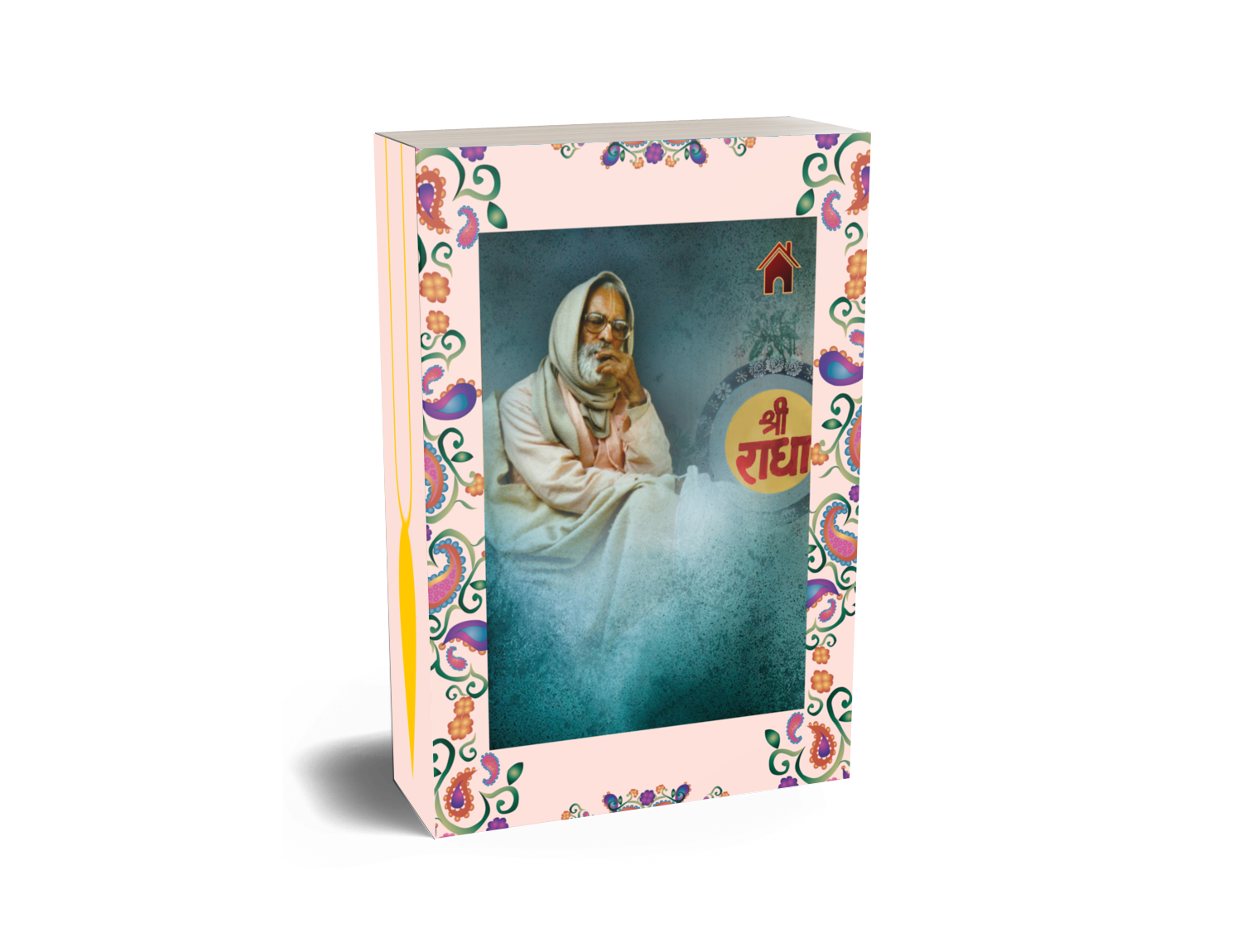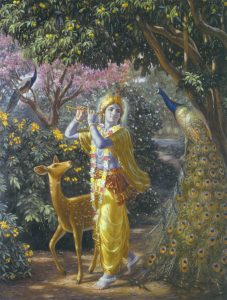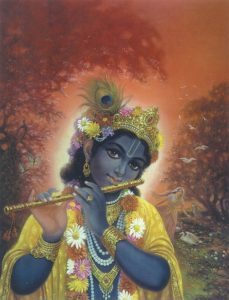

Chapter Seven from the book, Bhakti-rasāyana, 4th edition by Śrīla Bhaktivedānta Nārāyaṇa Mahārāja
gāvaś ca kṛṣṇa-mukha-nirgata-veṇu-gīta
pīyūṣam uttabhita-karṇa-puṭaiḥ pibantyaḥ
śāvāḥ snuta-stana-payaḥ-kavalāḥ sma tasthur
govindam ātmani dṛśāśru-kalāḥ spṛśantyaḥ
Śrīmad-Bhāgavatam (10.21.13); Bṛhad-bhāgavatāmṛta (2.7.117)
In order to drink the nectarean vibration of the flute song emanating from the lotus mouth of Śrī Kṛṣṇa, the cows have raised their ears. The grass that they were chewing just remains in their mouths, and milk begins to drip from their udders. The calves at once stop drinking their mothers’ milk, and as they embrace Kṛṣṇa within their hearts, tears of love begin to glide down their faces.
The gopīs are conversing about Kṛṣṇa in their homes during the daytime. But we are different; upon awakening  in the morning we just begin thinking about how to solve all of our worldly problems. Except for a very few persons, no one has the faith or the free time to chant the holy name, and even if someone has some faith and time, then we don’t chant in the way we should. Sādhakas should learn from the lives of the gopīs, who upon awakening in the morning begin meditating on Kṛṣṇa, which means that they begin burning in separation from Kṛṣṇa. Then they bathe and decorate themselves – for whom? Only for Kṛṣṇa. The theme of their conversation is: “How can we meet Kṛṣṇa?
in the morning we just begin thinking about how to solve all of our worldly problems. Except for a very few persons, no one has the faith or the free time to chant the holy name, and even if someone has some faith and time, then we don’t chant in the way we should. Sādhakas should learn from the lives of the gopīs, who upon awakening in the morning begin meditating on Kṛṣṇa, which means that they begin burning in separation from Kṛṣṇa. Then they bathe and decorate themselves – for whom? Only for Kṛṣṇa. The theme of their conversation is: “How can we meet Kṛṣṇa?
How can we serve Him?” Then they go to Nandagrāma to receive His darśana and to cook for Him. When Kṛṣṇa goes to the forest for the day, they return to their homes and converse about Him for the remainder of the day. In each group one gopī will be speaking, and so many other gopīs will be listening, and there are thousands of these groups. According to their particular natures, they are seated in groups and are singing about Kṛṣṇa’s pastimes.
We take our beads and sit to chant, but our minds wander here and there. Then another devotee comes and sits near us, and we begin conversing with him about this or that. We abandon our chanting of harināma, and he leaves it also. But the gopīs aren’t like this; one gopī says to another, “Aho! From the lotus mouth of Kṛṣṇa the sound of the flute has emerged. It has crossed the entire brahmāṇḍa, crossed Siddhaloka, Vaikuṇṭha, Ayodhyā, Mathurā and Dvārakā, and has now entered Vṛndāvana. While grazing, the cows hear this hypnotic vibration and at once raise their ears. The melody of Kṛṣṇa’s flute is like celestial nectar, and it is as if they are drinking that nectar through their ears. And the grass that they had taken in their mouths moments before is just remaining there! They aren’t swallowing it, and it isn’t coming back out of their mouths either. They are just standing motionlessly and listening.
“And when the calves who are drinking their mother’s milk hear the sound of Kṛṣṇa’s flute, the milk that they  had drawn out remains in their mouths! Usually it is swallowed immediately, but at that time it just remains in their mouths and then gradually begins to glide down from the corners of their mouths. What to speak of just these cows and calves, all the inhabitants of Vraja have become absorbed in the melody of Kṛṣṇa’s flute. But we are not so fortunate. These cows and calves are also shedding tears of prema, and sometimes even the clouds shed tears of prema for Kṛṣṇa as well. But it is our great misfortune that we are so hard-hearted that we don’t leave our homes at once and go to where Kṛṣṇa is playing His flute and become equally spellbound. Because we are afraid of being disgraced in society we are holding our patience and not going there, considering that there are too many obstacles. But if someday the sound of the flute really enters our hearts, then at once our patience will fly away and we will immediately run to Kṛṣṇa. If we could give up these bodies right now and take birth as calves, that would be very good! Then whenever we would hear the sound of Kṛṣṇa’s flute, we would go there at once! We would be entirely under His protection, and while gazing at Him we would forget everything else.”
had drawn out remains in their mouths! Usually it is swallowed immediately, but at that time it just remains in their mouths and then gradually begins to glide down from the corners of their mouths. What to speak of just these cows and calves, all the inhabitants of Vraja have become absorbed in the melody of Kṛṣṇa’s flute. But we are not so fortunate. These cows and calves are also shedding tears of prema, and sometimes even the clouds shed tears of prema for Kṛṣṇa as well. But it is our great misfortune that we are so hard-hearted that we don’t leave our homes at once and go to where Kṛṣṇa is playing His flute and become equally spellbound. Because we are afraid of being disgraced in society we are holding our patience and not going there, considering that there are too many obstacles. But if someday the sound of the flute really enters our hearts, then at once our patience will fly away and we will immediately run to Kṛṣṇa. If we could give up these bodies right now and take birth as calves, that would be very good! Then whenever we would hear the sound of Kṛṣṇa’s flute, we would go there at once! We would be entirely under His protection, and while gazing at Him we would forget everything else.”
In this way the gopīs are speaking. Just see the nature of their condition, their feelings. For receiving darśana of Kṛṣṇa and for hearing the melody of His flute, a sādhaka should have such feelings of separation (vipralambha-bhāva) in his heart, and then he will be engaging in real bhajana. If one’s sādhana is established on sound knowledge of Vaiṣṇava philosophy and he becomes free from anarthas such as fruitive activity, cultivating impersonal knowledge, laziness, criticising other devotees and committing offences, then Bhagavān will not be far away from him. Bhagavān is always just behind us, not far away. Paramātmā and ātmā are always together; they are not separate. Kṛṣṇa and our very souls are together within us, but at present we are not seeing Him because we don’t have sufficient faith.
If a person is crying out from afar, is there any friend or relative who won’t come to his aid? Even if there is a  son who has given his mother great difficulty, even to the point of trying to kill her, when he calls out in pain, will his mother not come to his aid? Are there any parents anywhere who could possibly ignore the pleas of their offspring? Perhaps only if they don’t hear them – but Kṛṣṇa is always nearby, and if we call out to Him, will He not hear? He is much more merciful than mere worldly parents. There is no place where He is not; He is always very near us inside our hearts. If we call Him sincerely, is it possible that He won’t hear us? Will Kṛṣṇa not hear if we loudly call out to Him? At present we don’t have sufficient faith, but when we pray from deep within our hearts with great faith and tears falling from our eyes, “O master of the gopīs, please hear my desperate prayer!” will He not hear it? Certainly He will; otherwise His name would have to be changed. When we have this mood, then what we are engaged in can really be called bhajana.
son who has given his mother great difficulty, even to the point of trying to kill her, when he calls out in pain, will his mother not come to his aid? Are there any parents anywhere who could possibly ignore the pleas of their offspring? Perhaps only if they don’t hear them – but Kṛṣṇa is always nearby, and if we call out to Him, will He not hear? He is much more merciful than mere worldly parents. There is no place where He is not; He is always very near us inside our hearts. If we call Him sincerely, is it possible that He won’t hear us? Will Kṛṣṇa not hear if we loudly call out to Him? At present we don’t have sufficient faith, but when we pray from deep within our hearts with great faith and tears falling from our eyes, “O master of the gopīs, please hear my desperate prayer!” will He not hear it? Certainly He will; otherwise His name would have to be changed. When we have this mood, then what we are engaged in can really be called bhajana.
Next comes this verse:
vṛndaśo vraja-vṛṣā mṛga-gāvo
veṇu-vādya-hṛta-cetasa ārāt
danta-daṣṭa-kavalā dhṛta-karṇā
nidritā likhita-citram ivāsan
Śrīmad-Bhāgavatam (10.35.5); Bṛhad-bhāgavatāmṛta (2.7.118)
Hearing the vibration of Śrī Kṛṣṇa’s flute, the bulls, cows and deer of Vṛndāvana approach Him. Unable to swallow the grass that they had taken into their mouths, they stand silently with their ears raised and appear like animals in a painting.
The previous verse is from the Veṇu-gīta, and this verse is from the Yugala-gīta. “O sakhī, hearing the sound of Kṛṣṇa’s flute and seeing His attractive form, the cows, bulls and deer of Vraja have become stunned and  forgotten everything. They have abruptly stopped grazing and the grass that they were chewing merely remains within their mouths. They have lifted up their tails and raised their ears, trying to discern from which direction that sound has come. When they realise the direction from which it has come, they slowly proceed until they come near to Kṛṣṇa. It is as if the vibration of the flute has entered through their ears, stolen their hearts and again exited their bodies. Therefore what can they do? They must follow that sound until they are near Kṛṣṇa, and since their hearts are no longer within them, they appear like motionless animals in a painting. Kṛṣṇa’s flute song has stolen their hearts and feeling themselves possessionless, they have approached Him as if begging alms.”
forgotten everything. They have abruptly stopped grazing and the grass that they were chewing merely remains within their mouths. They have lifted up their tails and raised their ears, trying to discern from which direction that sound has come. When they realise the direction from which it has come, they slowly proceed until they come near to Kṛṣṇa. It is as if the vibration of the flute has entered through their ears, stolen their hearts and again exited their bodies. Therefore what can they do? They must follow that sound until they are near Kṛṣṇa, and since their hearts are no longer within them, they appear like motionless animals in a painting. Kṛṣṇa’s flute song has stolen their hearts and feeling themselves possessionless, they have approached Him as if begging alms.”
Dhṛta-karṇāḥ – these animals’ ears generally droop down, but upon hearing the music of Kṛṣṇa’s flute, they raised them. At first they were listening, but then they reflexively turned their ears away from that sound so that it couldn’t enter. Why? They were thinking, “We won’t allow this sound to enter into our hearts, because then it will steal our hearts and may even steal away our very lives! We may die, and therefore we won’t allow this vibration to enter!” Kṛṣṇa’s appearance and the vibration of His flute are like nectar and poison simultaneously – viṣāmṛta ekatra-milana. It  cannot be discerned whether kṛṣṇa-prema is nectar or poison, just as when ice is placed in our hand, it feels as if it is burning. We can’t tell if our hand is burning or freezing. Similarly, coming in contact with kṛṣṇa-prema, we can’t discern whether we are feeling ecstasy or sadness. Saccharin has a bitter taste, but if you mix it with water it becomes sweet. And if you suck on a gooseberry, at first it seems sour, but when you get the juice it becomes sweet. Like this, externally kṛṣṇa-prema appears to be full of great sadness, and sometimes internally it may even feel something like sadness, but it is really the greatest happiness.
cannot be discerned whether kṛṣṇa-prema is nectar or poison, just as when ice is placed in our hand, it feels as if it is burning. We can’t tell if our hand is burning or freezing. Similarly, coming in contact with kṛṣṇa-prema, we can’t discern whether we are feeling ecstasy or sadness. Saccharin has a bitter taste, but if you mix it with water it becomes sweet. And if you suck on a gooseberry, at first it seems sour, but when you get the juice it becomes sweet. Like this, externally kṛṣṇa-prema appears to be full of great sadness, and sometimes internally it may even feel something like sadness, but it is really the greatest happiness.
So these cows closed their ears, and when upon opening them a little the vibration of the flute entered, they felt concerned for their very lives. They didn’t know whether to accept or reject it. In the same way, some people say, “My friend, there is no need for all of this devotion to God. Those who have bhakti actually have no happiness. Even in the stage of sādhana they are crying. They think, ‘By leaving home to engage in bhajana, I have made all of my family members cry, and I am no longer able to live with them.’ And look at what the composers of the scriptures have written:
nayanaṁ galad-aśru-dhārayā
vadanaṁ gadgada-ruddhayā girā
pulakair nicitaṁ vapuḥ kadā
tava nāma-grahaṇe bhaviṣyati
Śikṣāṣṭaka (6)
O Lord, when will my eyes be filled with a stream of tears? When will my voice choke up? And when will the hairs of my body stand erect in ecstasy as I chant Your holy name?
“They are praying for the day when they will never stop crying, and they desire to be always wailing in kṛṣṇa- prema. Actually it is not really such a surprising thing that they desire to cry in the stage of sādhana, because without a child crying, his mother will not feed him milk. All right, so they are crying in the stage of sādhana – but just look, then, at their stage of perfection! Uddhava and Akrūra were perfected souls, and we have heard that when they saw Kṛṣṇa’s footprints on the ground, they began wailing and even fell down and began writhing on the ground! And until the gopīs met Kṛṣṇa again at Kurukṣetra, they were always crying. And when they again parted, they cried even more! Even though they were perfected souls! Therefore all of this bhakti is just an unnecessary commotion.”
prema. Actually it is not really such a surprising thing that they desire to cry in the stage of sādhana, because without a child crying, his mother will not feed him milk. All right, so they are crying in the stage of sādhana – but just look, then, at their stage of perfection! Uddhava and Akrūra were perfected souls, and we have heard that when they saw Kṛṣṇa’s footprints on the ground, they began wailing and even fell down and began writhing on the ground! And until the gopīs met Kṛṣṇa again at Kurukṣetra, they were always crying. And when they again parted, they cried even more! Even though they were perfected souls! Therefore all of this bhakti is just an unnecessary commotion.”
But to persons who say this, we say yayātmā suprasīdati (Śrīmad-Bhāgavatam (1.2.6)): bhakti completely satisfies the soul with spiritual bliss. Without engaging in bhajana, no one can be happy. Churning water will never produce ghee. Even if all the people of the universe say that churning water produces ghee, will it happen? Never. And without engaging in hari-bhajana, no one can attain happiness or cross over this ocean of material existence. This point cannot be refuted any more than the fact that the sun will definitely set in the west. This is confirmed in the Vedas, the Rāmāyaṇa and all of the Purāṇas, and it cannot be refuted.
Meeting with Kṛṣṇa and separation from Him are simultaneously like nectar and poison, and their characteristics cannot be distinguished from one another. They become one and the same thing. Therefore these animals of Vraja become bewildered and concerned for their very lives, while at the same time the gopīs are saying, “In Vraja we are the most unfortunate. Everyone else is becoming filled with bliss by receiving Kṛṣṇa’s darśana, but we must remain here in our homes.”
Image/Art made possible by Pixabay.com & Krishnapath.org








